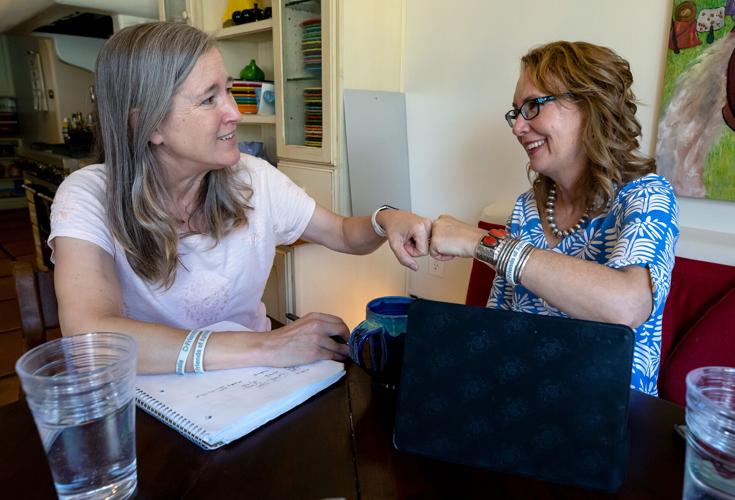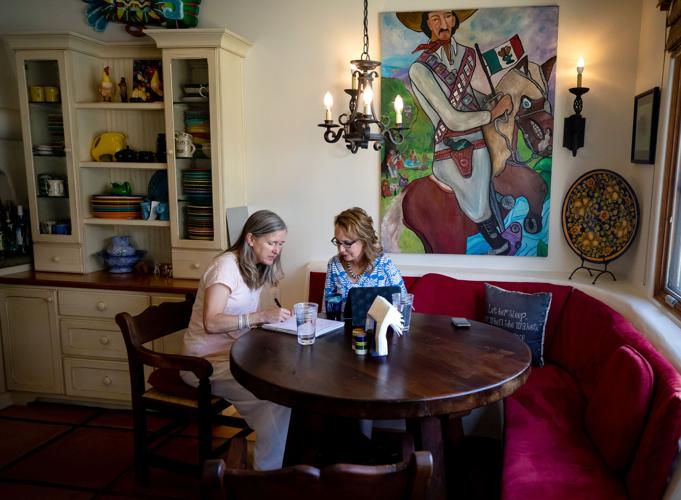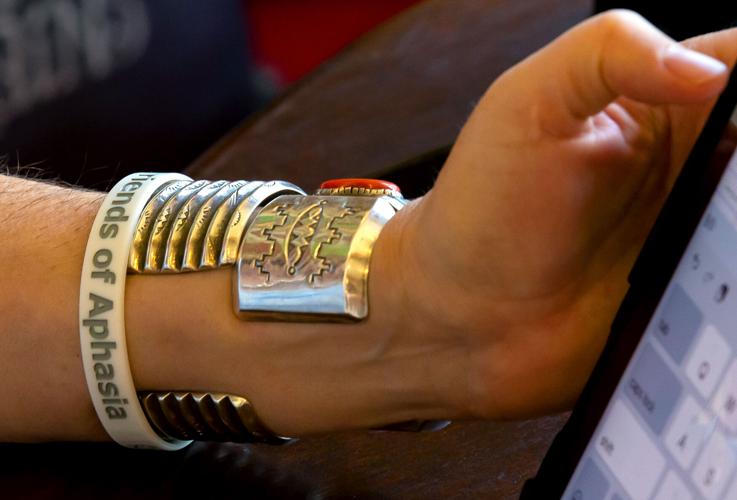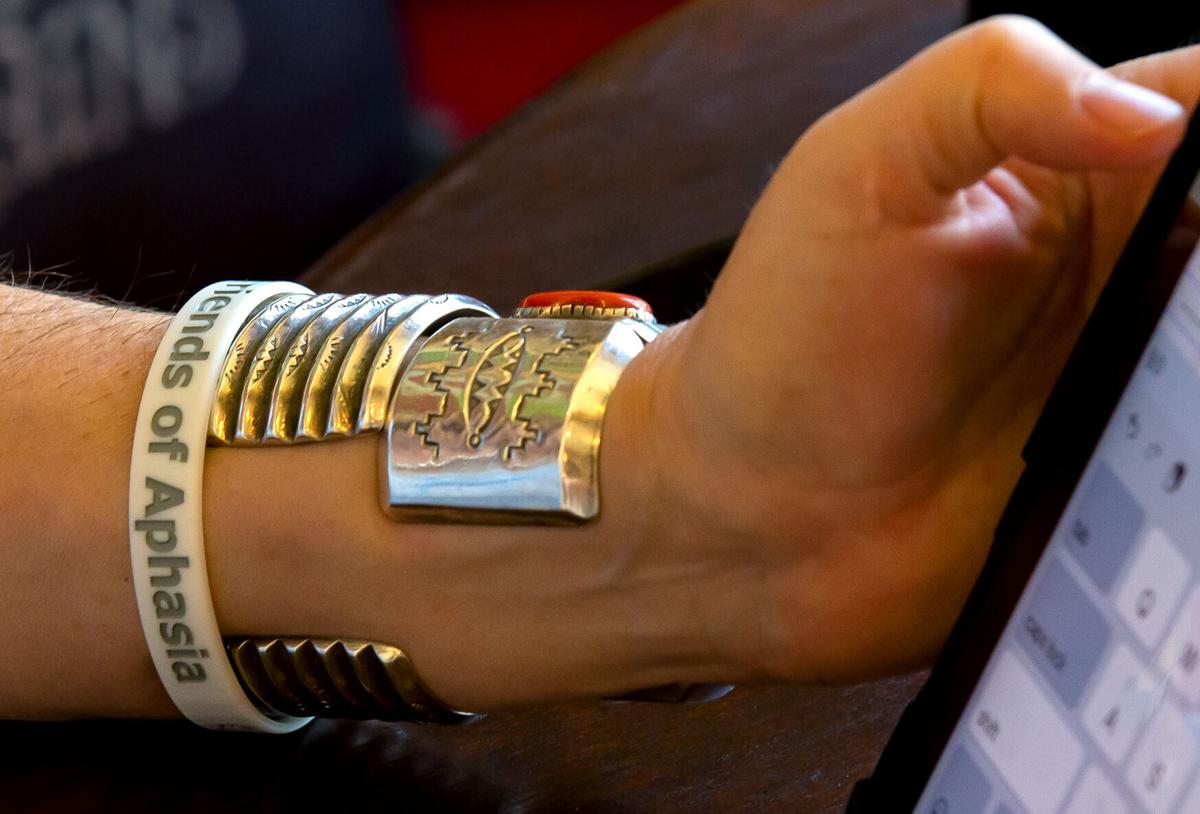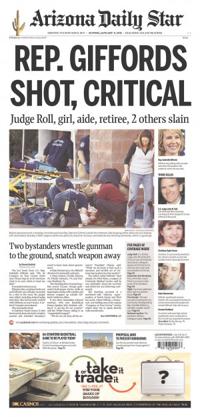Fabi Hirsch Kruse had just started her private practice when she was asked to help one of her field’s most famous patients.
Former Congresswoman Gabrielle Giffords had been shot during a 2011 “Congress on Your Corner” event in Tucson. One of her primary challenges: aphasia, a condition nearly 85% of the country has never heard of, according to the National Aphasia Association.
This summer’s release of Giffords’ documentary, “Won’t Back Down,” along with actor Bruce Willis’ recent diagnosis, have brought more attention to this devastating condition affecting roughly 2 million Americans — and over 6,000 Pima County residents.
Aphasia is often brought on by a stroke or, as in Giffords’ case, a brain injury. Other causes can include a brain tumor or infection. Kruse said they are now also seeing more cases related to brain degeneration, leading to a type called Primary Progressive Aphasia.
Kruse, who earned her doctorate in speech and hearing sciences at the University of Arizona, said her interest in aphasia started when she was completing her master’s degree, and began working with a police officer who’d had a stroke.

Speech-Language Pathologist Fabi Hirsch Kruse, left, fist bumps former Congresswoman Gabrielle Giffords after Giffords formed a sentence for her journal during a speech therapy session at Giffords’ home in Tucson.
“When I first started looking into speech therapy as a career, I thought I would work with children,” she said. “I had never heard of aphasia, and didn’t really even know that adults could have speech and language difficulties that require therapy.”
Kruse remembers being struck that someone could lose such critical abilities: speaking, understanding language, reading, writing.
“I was touched both by the tragedy of aphasia, and the incredible determination people demonstrated in the face of it,” she said. “I felt that if I could have any impact on making their lives better through my work, that was what I wanted to pursue.”
Friends of Aphasia
Giffords has been living with aphasia for 11 years after a bullet damaged the left side of her brain, which is where language function is centered.
“Gabby is very unique,” Kruse said. “A gunshot wound to the head. Most don’t survive it.”
About four years ago, to help more people with these challenges, Kruse and Giffords started a nonprofit called Friends of Aphasia, located at 1011 N. Craycroft Road, Suite 301.
Early last week, Andy Ortiz, Christina Thomas and Rona Howard gathered there, with Kruse, for a group therapy session. Each of these Tucsonans developed aphasia after a stroke, and each have unique challenges when it comes to language and communication.
That’s typical, Kruse says. Aphasia is different for everyone, and some find it easier to speak than to read or write, while others are the opposite. Sometimes, people mistakenly think people with aphasia have a cognitive challenge, or that they have been drinking or using drugs.
“The thing that’s really important to know is that it does not impact cognition,” Kruse said.
What it does impact is a person’s ability to connect with others, and can lend itself strongly to social isolation and loneliness.
Support groups are critical for this reason, Kruse said. It’s vital for people with aphasia to come together and work on things without feeling pressure.
“People want to do things so quickly,” Kruse said of the public in general, “especially talking.”
Yet while aphasia is very challenging, Kruse said people at her center share a lot of laughs and discuss many things: dating, finding new purpose in doing volunteer work, work woes.
During therapy, Kruse is constantly writing down what people say and then showing it back to the group. She does this for a number of reasons: some members have impaired auditory comprehension and it helps to have the spoken word paired with the written word.
Another reason, she said, is to help people follow a train of thought, and recall where the conversation is at if they lose their place. Lastly, it serves as a way to maintain a record of what was shared. That way, a group member can point to a word and resume the conversation if they’ve lost their place.
During the height of the COVID-19 pandemic, Kruse started doing virtual programming with these methods, and just resumed in-person sessions a few months back. Those virtual programs have also kept going, with members tuning in from all over the country.

Speech-Language Pathologist Fabi Hirsch Kruse, left, works with former Congresswoman Gabrielle Giffords during a speech therapy session at Giffords’ home in Tucson.
‘Had to give that up’
During last week’s session, Thomas shared how she’d like to visit her daughter in Germany but the stroke has left her nervous about flying, even though her neurologist said it’s fine. In a few months, it will have been four years.
Thomas was initially told she would never walk or talk again, but she’s proven that was wrong. Still, some things are no longer within grasp.
“For 30 years, I was an accountant and now I can’t,” she said, clearly but slowly. “It’s hard. I had to give that up.”
While Thomas communicates clearly at times during the session, other times she pauses for a long spell, and sometimes the words didn’t come to her at all.
Among the hardest words for many people with aphasia to say are functors, the little words we say over and over again including pronouns, prepositions and conjunctions.
Ortiz, who had a stroke two years ago, finds it most challenging to comprehend what’s being said, especially if people are in a rush. One example: ordering in a restaurant. Questions from wait staff can be overwhelming, he said.
‘We make it work’
When Howard had her stroke six years ago, she was 43 and running her own cleaning business.
She had to shut it down.
Howard uses an app called Speech Assistant on her phone to talk, and uses pre-programmed messages or writes new ones herself. In a recent Facebook post, she shared what it’s been like to be a mother with aphasia raising a teenager.
“My daughter knows that when I’m typing something she sits down next to me and patiently waits for me to finish,” she wrote. “We talk about everything until I’m sure she understands me. Sometimes we are both exhausted but we make it work.”
Howard wrote that she can sometimes hear her daughter making her own doctor’s appointment “because I can’t talk on the phone.”
“She is 18 years old now and just graduated high school,” she said. “Aphasia just brought us closer. We have our own special language.”
Photo galleries of the mass shooting in Tucson on Jan. 8, 2011
The January 8th Memorial is nestled along the west side of the historic Pima County Courthouse, where almost an acre of gardens and paths surr…
Six people died and 13 were injured by gunfire when a gunman opened fire outside the Safeway store at Ina and Oracle roads north of Tucson on …
Six people died and 13 were injured when a gunman opened fire outside the Safeway store at Ina and Oracle roads on Jan. 8, 2011.
Photo coverage of events and developments on the day after the shooting of Rep. Giffords and the deaths of six people.
Photo coverage of events and developments surrounding the shooting of Rep. Giffords and the deaths of six people.
"Mass for the Healing of Our Community, Remembrance of Those Who Have Died, and for the Consolation of All Victims and Their Families" at St. …
President and First Lady Obama visit Tucson Wednesday, January 12, 2011 for a memorial service "Together We Thrive: Tucson and America" to hon…
The funeral of Christina Taylor Green was held Thursday, January 13, 2011 at St. Elizabeth Ann Seton Catholic Church. Green was killed in the …
Images from the three large memorials for the victims of the January 8th, 2011, shooting.
Front pages of different newspapers' coverage of the mass shooting in Tucson on Jan.8, 2011, that left six people dead and more than a dozen wounded.

